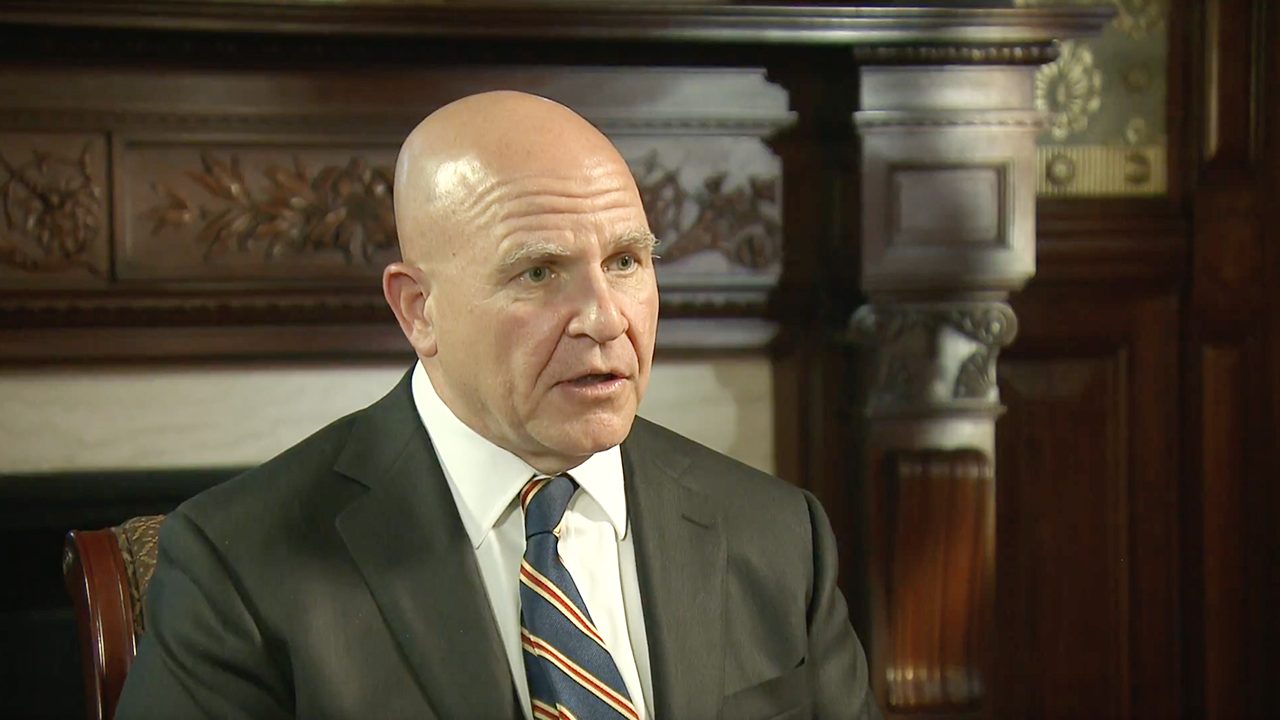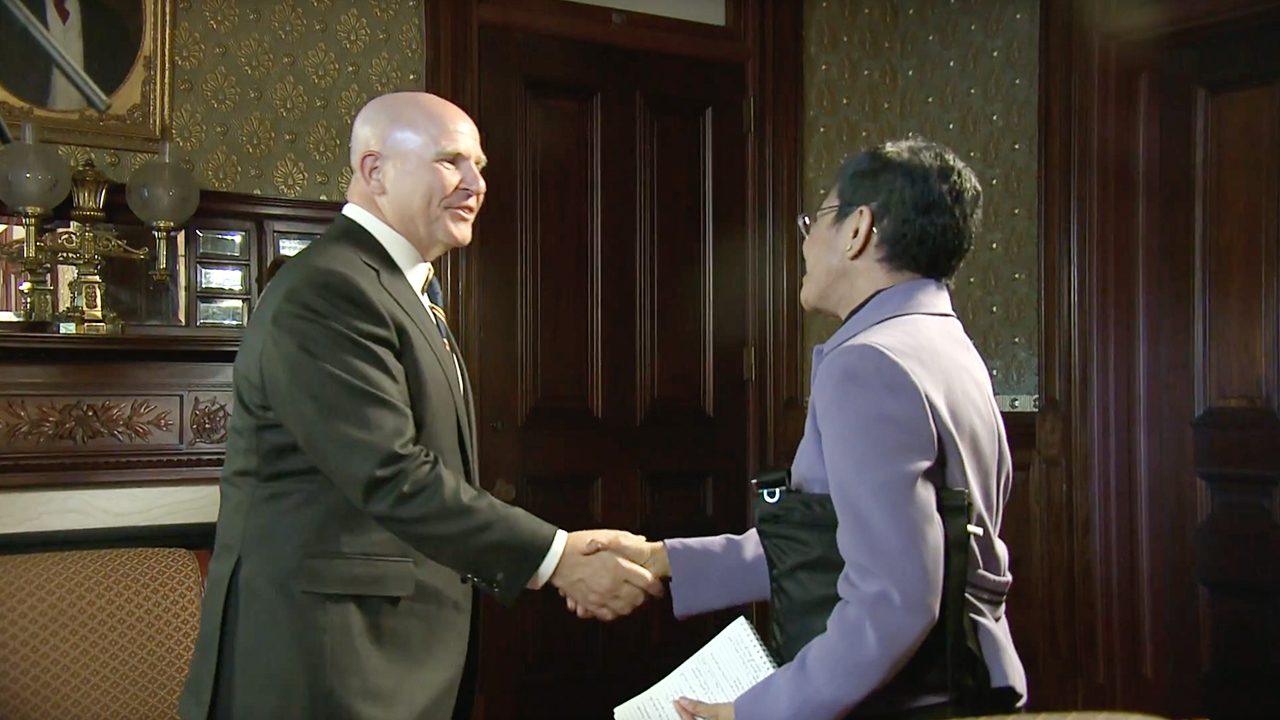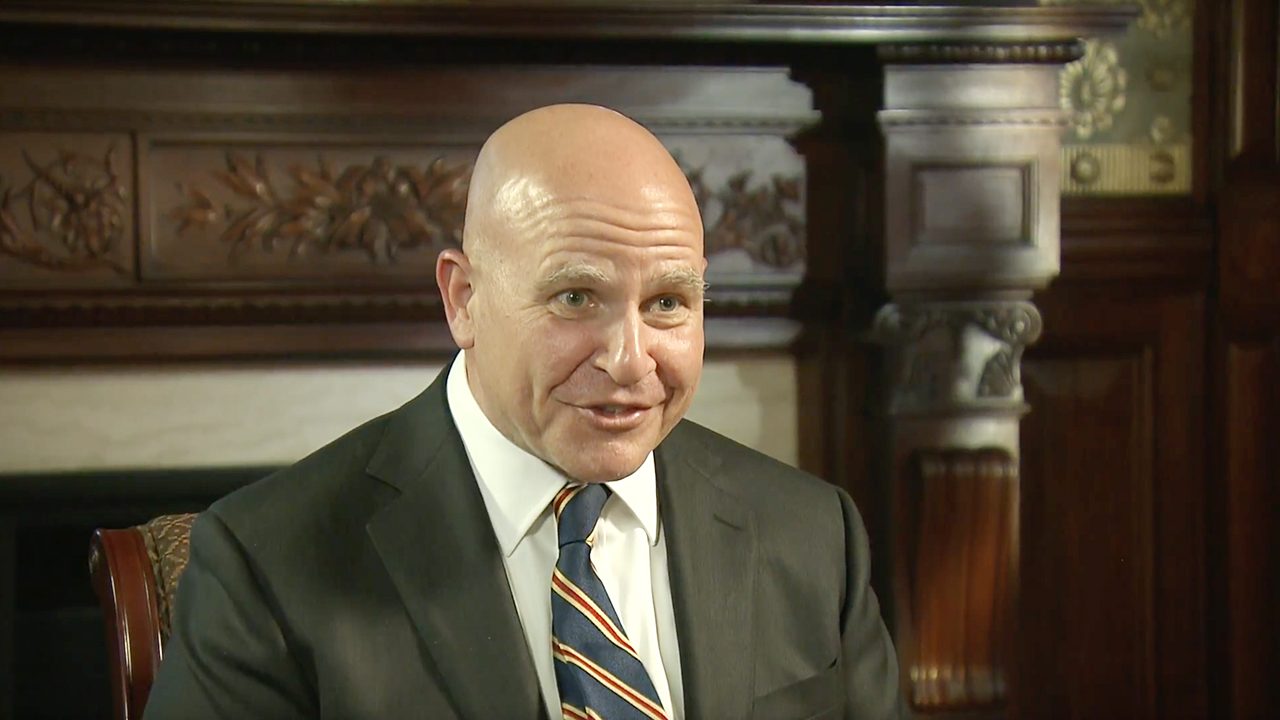SUMMARY
This is AI generated summarization, which may have errors. For context, always refer to the full article.

MANILA, Philippines – Rappler executive editor Maria Ressa in her recent trip to the US sat down with US national security adviser HR McMaster to discuss President Donald Trump’s first visit to the Philippines later this week. (READ: Trump Asia tour to focus on actions ‘short of war’ vs North Korea)
The Philippines is the last leg of Trump’s first Asia tour. McMaster said the tour will focus on addressing the threat from North Korea’s nuclear weapons ambitions, but added Trump will also push for freedom of navigation, freedom of trade and economic relationships, and a broad range of security issues.
McMaster hailed the alliance between the US and the Philippines as shown in the recent war against local armed groups linked with the Islamic State (ISIS). He said he is confident the ties will survive President Rodrigo Duterte’s supposed pivot to China.
McMaster said Trump could also discuss “privately” with Duterte his controversial war on drugs.
Read the transcript of the interview below.
Maria Ressa: What are you after in the state visit in Philippines?
HR McMaster: The President is very much looking forward to visiting the Philippines. As you know, the Philippines is one of our longest treaty allies in the Pacific. The Philippines is really central geographically and also central philosophically to the President’s policy that is founded on the importance of a free and open Indo-Pacific region. (READ: Duterte’s pivot to China won’t be easy for Americanized PH military)
We have been great partners for a long time on issues of security and fostering security, not only in the Philippines, but broadly in the region. Most recently, our forces played a contributing role to this tough campaign in Mindanao against this brutal and murderous enemies of all civilization. We are bound together in so many ways through a shared history. It hasn’t always been rosy but it’s been a history that has been dominated by a very positive relationship that has benefited the people of the Philippines and the people of the United States. And as you know there’s a very large Philippine-American population who all of us love. They are the most hospitable and fun people to be around. You can always count on great food and lots of photos.
Ressa: As national security adviser – between China, North Korea, ISIS, and cybercrime – which do you consider the greatest threat to the region?
McMaster: These are a combination of threats and challeges and some opportunites. Of course the most immediate threat comes from North Korea and we really appreciate the effort of the Philippines and President Duterte in constraining North Korea’s commerial activites, their illicit activites, and their profit-making shemes where they use this kind of slave labor. They also engage in all sorts of organized crime activites. It’s really an opportunity now for all nations to constrain and isolate North Korea politically and economically. We want the leadership there to conclude that they have no option really but to denuclearize. I’d say that’s the most immediate threat.
There are long term challenges and what we would hope for is that all countries across the Indo-Pacific recognize the importance of free and open freedom of navigation, freedom of trade, and economic relationships. These are relationships that are not based on subservients of one country to another, but relationships that strengthen the sovereignty of all nations. This will be a big aspect to the President’s message.
And then, of course, you have this terrible threat of these terrorist organizations who use an irreligious ideology to foment hatred and use that hatred to justify violence against innocent people. When the President met with leaders of over 50 Muslim majority nations in Riyadh in Saudi Arabia early this year, he emphasized 3 things that he will continue to emphasize when he works with the leadership in the Philippines as well as across the region. The first of these is, we must deny them safe havens and support bases. The very courageous Philippine soldiers and armed forces in Marawi, they demonstrated the Filipino determination to deny them safe havens and support bases. (WATCH: Documentary | Marawi: 153 days of war)
The seond is to cut off financing – their ability to generate funds and mobilize resources. And the third is to combat their ideology. There are leaders in each of these areas across the Indo-Pacific region. Singapore, for example, is very good at financial actions and helping understand better how to cut off these financial transactions. Malaysia has also taken a lead over the years on countering the ideology. This is an opportunity for the leaders to have discussion around all of these security issues you mentioned. I think what they’ll do is to look at this positively and identify opportunities to improve security across all these areas.

Ressa: The United States is in a difficult balancing act right now because President Duterte has said that he will pivot away from the United States to China and Russia. How do you look at that?
McMaster: The US is confident that, that pivot could turn into a pirouette. The reason is if you look at the systems – just look at what countries have to offer – which club do you have to join? What party do you want to go to? I think that the American people are more confident than ever under President Trump’s leadership and the American system, and our respect for sovereign nations, and our desires for our partners and allies to be strong and independent countries. The alliance is based on mutual benefit and mutal respect.
Ressa: President Duterte has been called the “Trump of the East.” President Trump has been called the “Duterte of the West.” They are both maverick leaders who have in many ways moved against what their establishments have done. What does it mean for the rest of the world?
McMaster: What the President has done is he developed very close relationships across the world that has helped not just advance American interest but advance the interest of all civilized people. Look at what happened in the Indo-Pacific region since the horrors of World War II, the bloodiest war in human history. The Filipino people bore that brunt of that war in many ways. Look at the year since then. Due mainly, I would say to US engagemeent in the regions, hundreds of millions of people have been lifted out of poverty.
There has been no great power conflict. Economic growth and prosperity have occurred at an unprecedented rate. What we have an opportunity to do now is to celebrate. In the Philippines, we should celebrate the role of the US in the region across the last 70 years, consolidate some of the gains that have been made, and then help develop a vision. I think this vision of a free and open Indo-Pacific ought to be attractive broadly.
But what the President doesn’t want to do is come with just his vision and say, “Please sign up for this.” What he wants to do is hear from the leaders in the region about how they would like the US to engage from a security perspective and from an economic perspective. Certainly the US, as it has always done, has done so in a way that is mutually beneficial.

Ressa: President Duterte in his conversation with President Trump actually supported President Trump and President Trump supported President Duterte’s very controversial war on drugs. How will that play out and will the United States continue to push for human rights? The Philippines has been criticized for this war on drugs.
McMaster: The United States always pushes for human rights. What President Trump prefers to do is to have a sincere conversation about these issues. As we know here in the United States, drugs is a terrible scourge. But what we also have to understand is that the best way to deal with this kind of a severe problem is through preserving the rule of law. These are conversations that leaders can have in a frank, open, and private manner, I think. It will be helpful to both countries to have that conversation. The President just declared a national emergency involving opiod use by 68,000 people a year. That’ s a huge number. The President is very concerned about the drug problem, but also the way that we will go after that here is to do it through more effective law enforcement as well as a broad range of other actions, including education. There is a full strategy that Governor Christie of New Jersey is helping lead up. But this is another area that we can work on together. How to combat this very severe problem. – Rappler.com
Add a comment
How does this make you feel?
There are no comments yet. Add your comment to start the conversation.